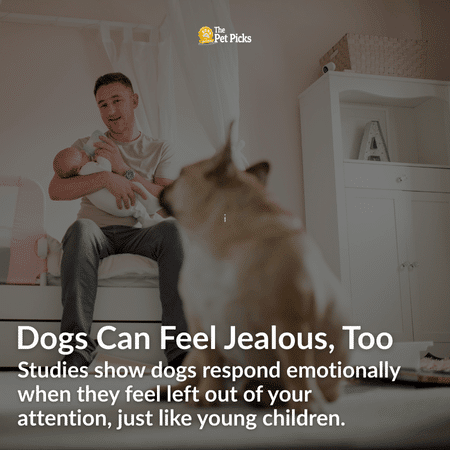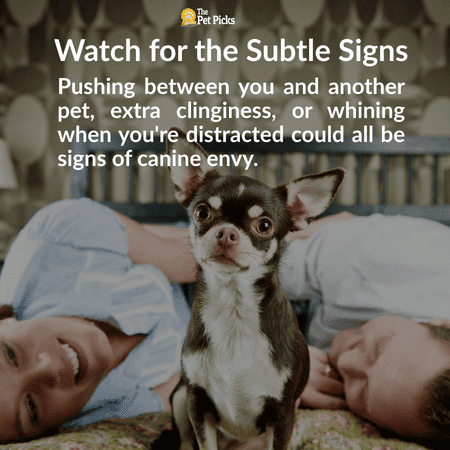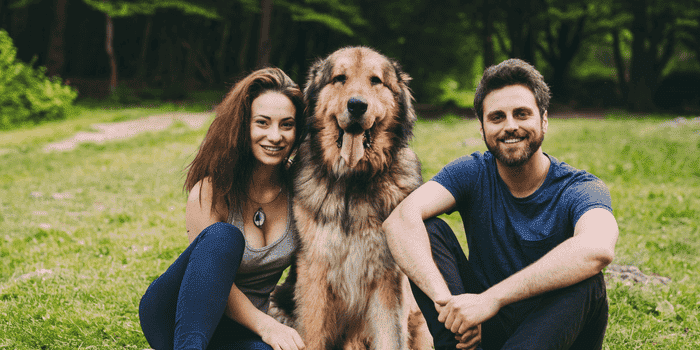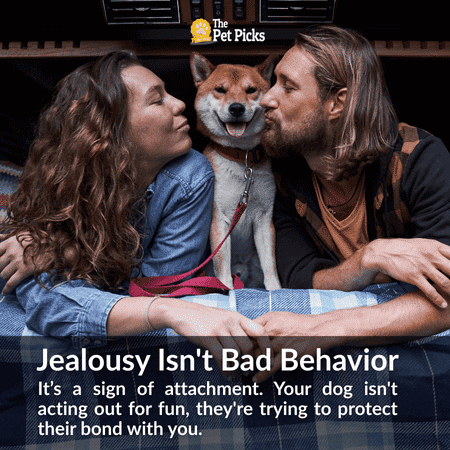Are Those Puppy Eyes Hiding a Green-Eyed Pup?
We’ve all seen it. You hug another dog or give your partner a cuddle, and suddenly your pup nudges in between, tail stiff and eyes locked on you. But is that just attention-seeking, or is it something deeper? Could your dog be jealous?
Turns out, science has started to answer that very question. And the findings are as fascinating as they are important for pet parents who want to better understand and support their furry family members.
More Than Just Puppy Drama: The Science Behind Jealous Dogs
For years, jealousy was considered a uniquely human emotion, too socially complex for animals. But several groundbreaking studies now suggest dogs do experience jealousy in their own way.
A 2014 study by the University of California found that when pet parents paid attention to a realistic stuffed dog, 78% of the dogs pushed or touched their owner, and about a third tried to get between the two. That behavior looked an awful lot like classic jealousy.
Even more compelling, a 2021 study by the University of Auckland showed dogs trying to physically intervene not only when their owner interacted with a rival dog, but even when it merely appeared that way. Dogs were reacting to what they believed was happening, not just what they could see or smell. That means dogs may hold a mental representation of social relationships, including threats to them.
In plain terms? Your dog may get jealous not just because another dog is near, but because they think you’re giving your love elsewhere.

Recognizing Jealous Behavior in Your Dog: Not Just a Cute Quirk
Jealousy doesn’t always come with bared teeth or angry barks. In fact, many signs of canine envy are easy to miss or misinterpret as playfulness, neediness, or stubbornness.
Here are some of the most commonly observed behaviors when a dog feels jealous:
- Pushing between you and another person or pet
- Barking, whining, or growling when you're interacting with someone else
- Snapping or nudging the object of your attention
- Suddenly ignoring commands they usually follow
- Clinginess or excessive attention-seeking afterward
While these reactions might seem minor, they can escalate if not addressed. That’s especially true in multi-pet households, or when new family members (two-legged or four-legged) enter the picture.
Understanding these signals is the first step to helping your pup feel secure and loved.
What Jealousy Really Means for Your Dog's Emotional World
Dogs don’t feel jealousy in the exact same way humans do. But research shows their behavior in competitive social settings often mirrors that of a young child. Like a toddler who sees their sibling getting a bigger slice of cake, your dog notices how attention, praise, or affection is shared.
What’s key here is context. Dogs who saw another dog receiving a treat when they didn’t were more likely to stop performing commands. But if they were alone and unrewarded, they kept trying. This suggests their emotional response wasn’t just about not getting a reward. It was about someone else getting it instead.
In other words, dogs don’t just want your love. They want to know they’re not being left out of it.
Helping Your Dog Cope With Jealousy: What You Can Do
If you’re seeing signs of jealousy, don’t panic. It's not a flaw. It’s a sign your dog values their bond with you. But it’s also something you can gently guide with a few practical strategies.
- Reinforce positive behavior. When your dog remains calm and patient while you’re giving attention to others, offer praise or a treat.
- Avoid rewarding jealous outbursts. If your dog barks or pushes for attention when you're focused elsewhere, don’t immediately respond. Wait for calm before engaging.
- Offer one-on-one time. Set aside dedicated bonding moments each day. Walks, playtime, and even grooming sessions help your dog feel secure.
- Use commands they know. If they act out, redirect with basic commands like sit or stay. Reward them once they’ve calmed down.
- Be consistent. In homes with multiple pets, ensure each dog gets consistent affection, attention, and play.
If jealousy turns into aggression or intense anxiety, it’s worth speaking with a professional dog trainer or behaviorist.
Extra Love Goes a Long Way (But So Does Structure)
It’s tempting to smother a jealous dog with reassurance, but sometimes that backfires. Dogs, like kids, respond best when they understand boundaries and trust that love won’t be taken away. Even when attention shifts temporarily.
That’s where consistency becomes your best tool. Your dog isn’t just looking for more love. They’re looking for reassurance that their place in your life is safe.

Final Thoughts: Your Dog Isn’t Possessive, They’re Protective of Your Bond
Jealousy in dogs isn’t petty or manipulative. It’s a reflection of their deep social attachment to you. They’re not competing for toys or treats. They’re protecting something more important. Your relationship.
So next time your pup squeezes between you and your partner or whines when you scratch another dog’s ear, take a breath. Recognize it for what it is. A reminder of how much you matter to them.
And then, gently show them they matter just as much.
FAQs
Do dogs get jealous of babies or new family members?
Yes, especially when those new arrivals seem to “replace” the dog as the center of attention. Make sure your dog is gradually introduced, given time to adjust, and still gets special one-on-one time.
Can jealousy lead to aggression in dogs?
It can, particularly if left unchecked. If your dog begins snapping, growling, or guarding you aggressively, seek help from a trainer or veterinary behaviorist.
Is my dog jealous or just being protective?
Jealous dogs usually act out when you give attention to someone else. Protective dogs tend to respond to perceived threats. Watch the context and body language to tell the difference.
How can I prevent jealousy in a multi-dog household?
Balance is key. Feed, walk, and play with dogs in the same order every day. Offer praise evenly. Prevent favoritism whenever possible.
Are some breeds more prone to jealousy than others?
While all dogs can feel jealousy, breeds known for strong bonds with humans, like shepherds, retrievers, or lap dogs, may show more jealousy-related behavior.
A Loving Reminder
The information provided at ThePetPicks.com is based on research and expertise, aiming to enhance the bond between you and your dog. However, it’s essential to remember that every dog is unique. Always consult with professionals, like veterinarians or trainers, for specific concerns or advice. At ThePetPicks.com, we believe in “Trust Born from Love,” and we encourage every pet parent to make informed decisions rooted in love and care.


